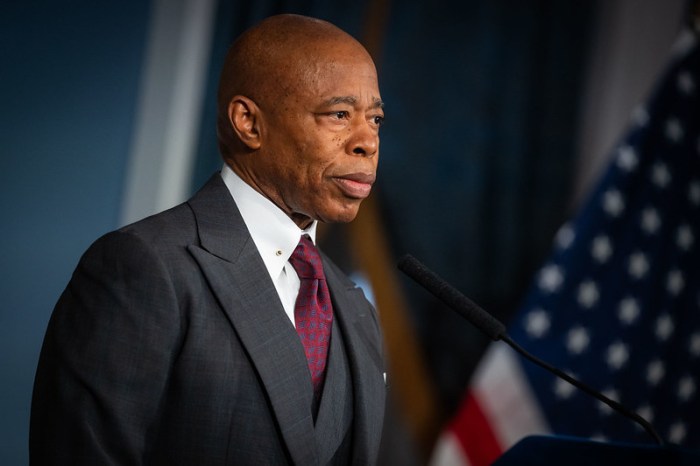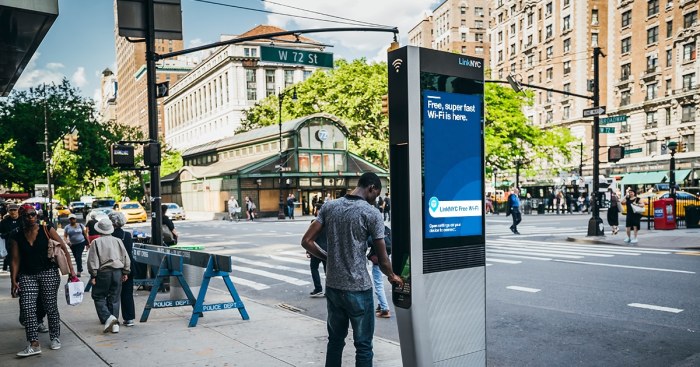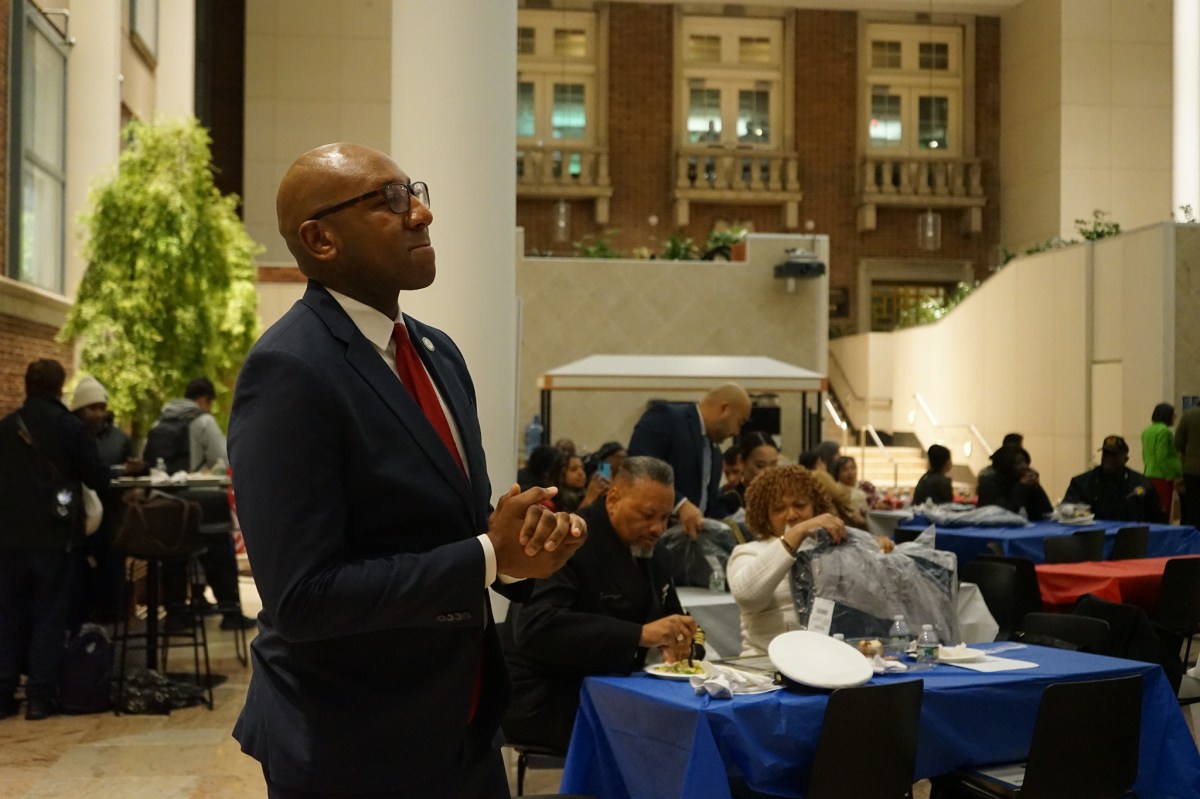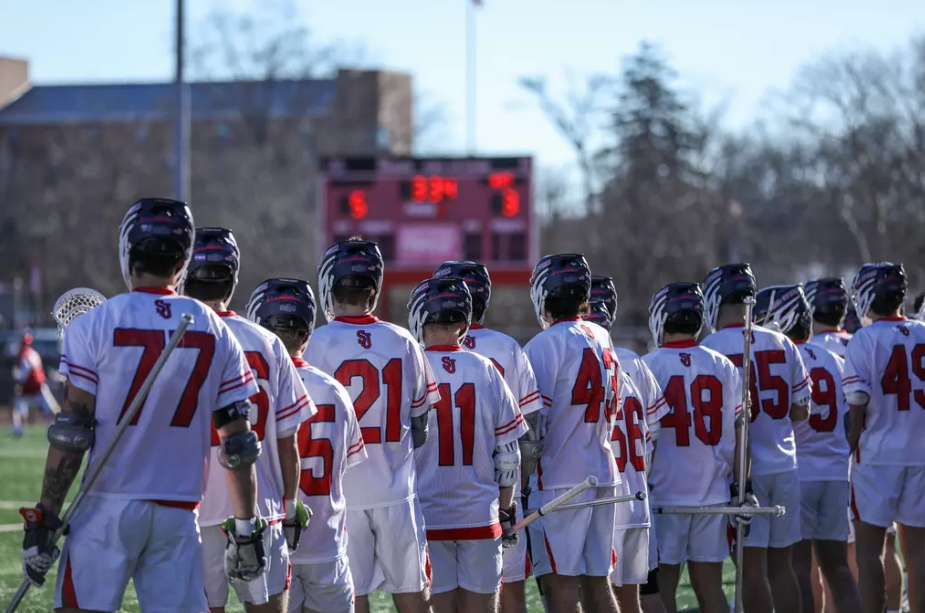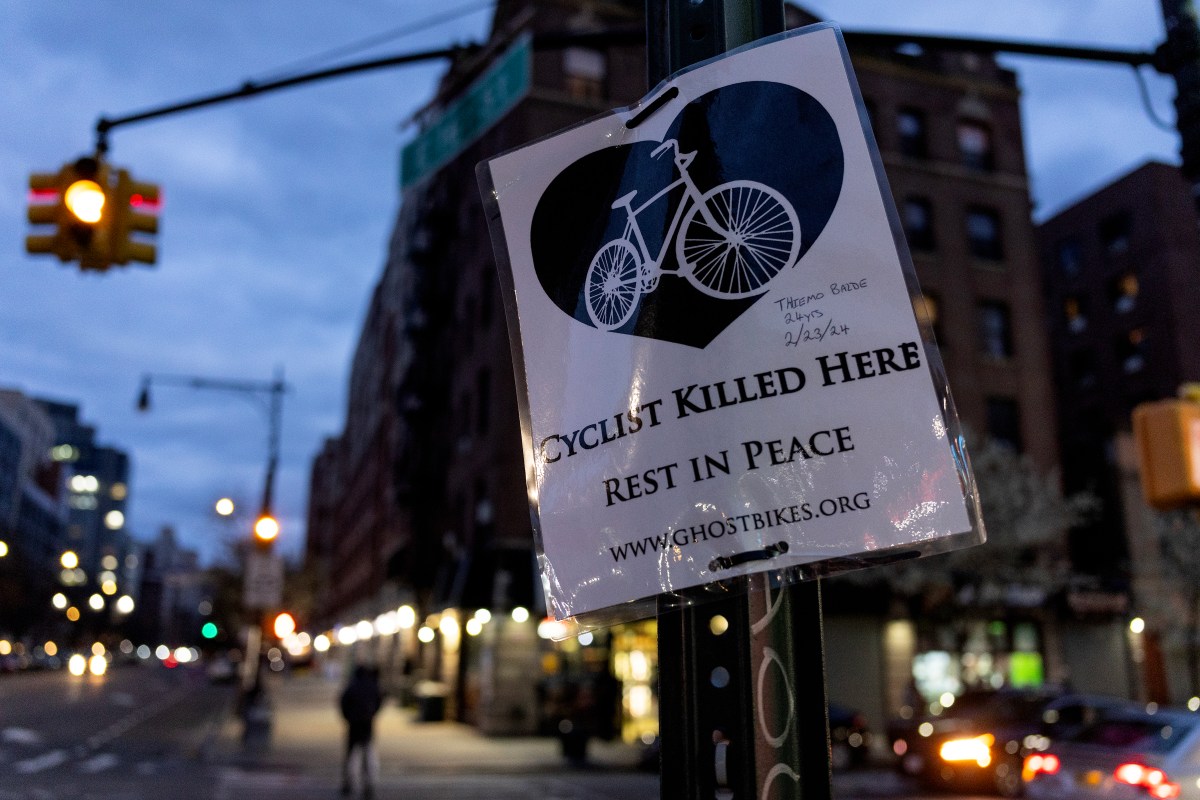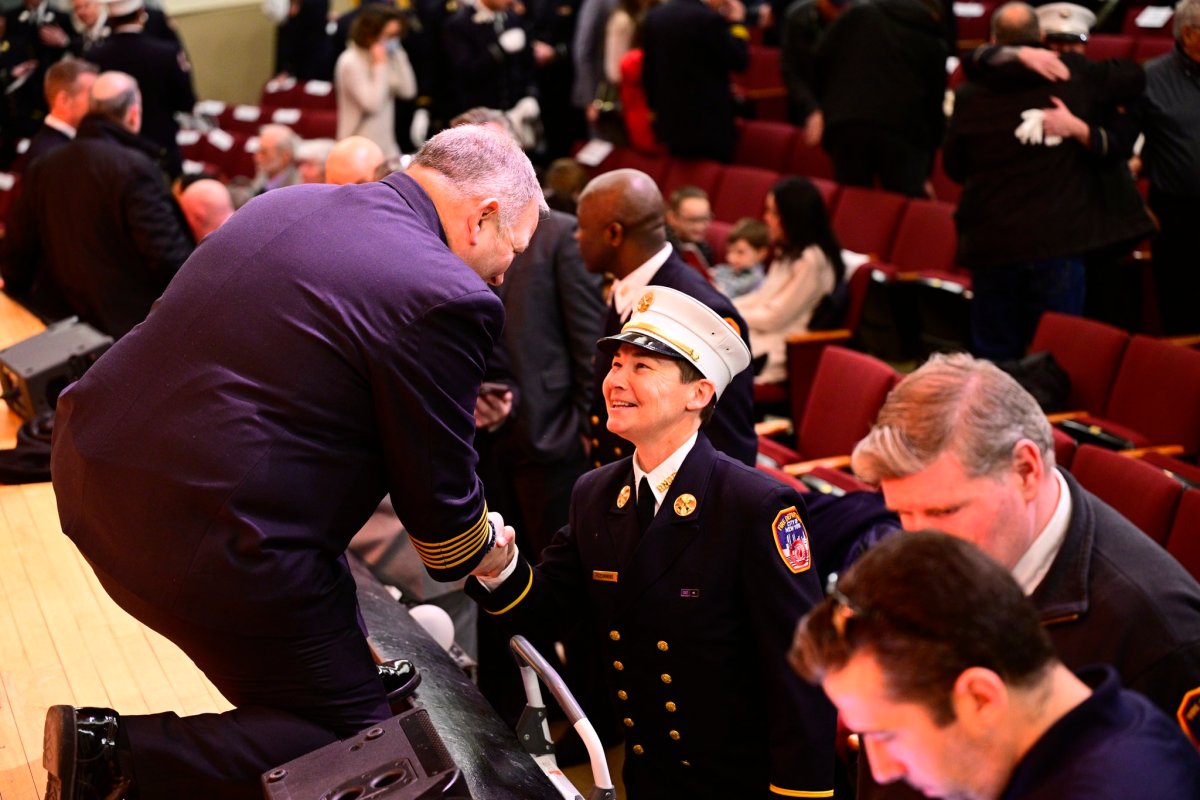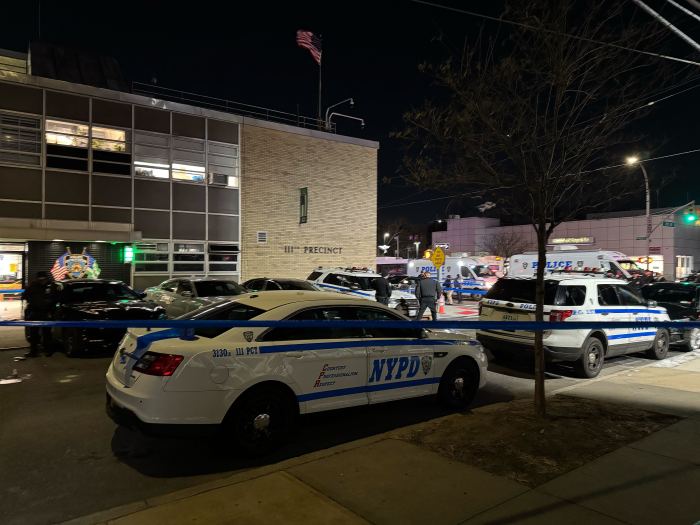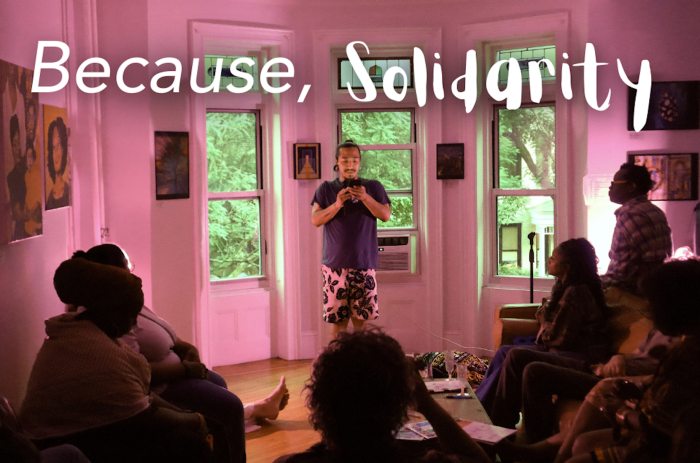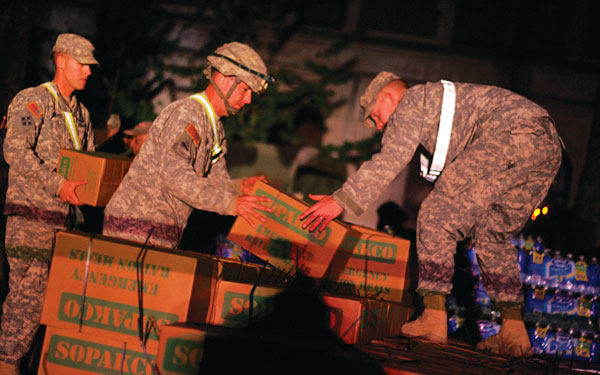
BY SAM SPOKONY | In a shaky yet mainly successful start to the National Guard’s increased presence in Downtown Manhattan following the impact of Hurricane Sandy, on Thursday night hundreds of desperate residents welcomed a massive delivery of food and water outside a Lower East Side public housing complex.
The Guardsmen were originally scheduled to arrive to deliver the rations at 1 p.m. that day outside Smith Houses on Catherine St., near Cherry St. — but the people lined up waiting for hours for the drop-off became increasingly agitated until the trucks finally arrived around 6:15 p.m.
Despite many harsh words over the lateness of that arrival, the residents certainly appreciated the vital supplies, as their neighborhood continues to sit in darkness.
“We would’ve gone crazy if they didn’t come,” said Tony Chan, 40, who came with his family several blocks from their home on Mott St. to pick up a box full of food and water bottles.
Chan explained that, even though other problems still loom large, the rations provided an important lifeline to people like himself, who simply hadn’t been ready for such a difficult aftermath to the storm. Before the delivery, he had no food or water.
“The only thing we could’ve eaten was a rat,” Chan joked, as he walked home.
Governor Andrew Cuomo had originally mobilized the National Guard on Oct. 28, the day before the hurricane struck. And on Thursday morning, at the behest of local politicians, Cuomo announced the Guard would be delivering one million meals — supplied by the Federal Emergency Management Agency — to Downtown Manhattan and affected areas in Brooklyn and Queens.
Assembly Speaker Sheldon Silver and State Senator Daniel Squadron, both of whom were part of a group that urged the governor to implement the deliveries, were outside Smith Houses on Thursday night with their aides to help oversee the arrival hand out the rations. Although the crowd of hungry residents never became mob-like, the scene was somewhat frantic, as dozens of Guardsmen rushed to stack hundreds of cases of water bottles and sealed boxes of emergency meals.
Silver noted that, in terms of a potentially life-saving delivery, it was better late than never.
“It’s unfortunate that it isn’t taking place quite when they expected it to, but the need is being met,” Silver said. “This is just what happens when people are making decisions and trying to find answers in real time.”
The speaker added that, shortly after the National Guard arrived, he called the governor to say that the timeliness of deliveries would have to improve over the next few days.
According to an onsite member of the Salvation Army, which is helping to coordinate the shipments of the FEMA rations, the Guard will continue the deliveries at about 15 sites throughout the aforementioned areas until Sunday.
“I said to [Cuomo] that we’ve got to beef up the distribution process, because there were people here waiting for hours,” Silver said. “He told me that the sites were actually chosen by the city, and not his office. But it’s not about blaming anyone, because we’re all in this together. At this point we just need to make sure that people get what they need, because these are trying times for everybody.”
They were especially trying times for the many
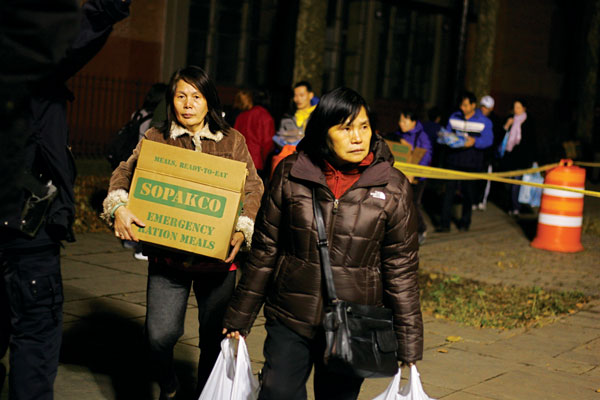
Chinatown residents who were left disappointed, and perhaps still hungry, by the National Guard’s late arrival on Thursday.
A drop-off similar to the one at Smith Houses was scheduled to take place outside Confucius Plaza, on Bowery between Canal and Division Sts., at 1 p.m. that day. But the arrival was reportedly rescheduled to 3 p.m., and then, after hours of miscommunication and speculation, the Guard did not arrive in time to actually hand out rations.
The delivery was in fact made to Confucius Plaza after the Guard finished its work at Smith Houses, but since it was already dark at that point — past 7:30 p.m. — the food and water was reportedly put into storage at the Chinatown building, so it could be handed out the following day.
It wasn’t only residents of the 44-story Confucius Plaza complex who were left wanting by the Guard’s failure to reach the building in time — as with the Smith site, residents from around the neighborhood showed up, many carrying a visible sense of desperation.
“We have nothing,” said a 24-year-old woman named Shatima, who has lived her entire life in the Baruch Houses projects, on Delancey and Columbia Sts., and declined to give her last name. “It’s gotten so bad that people are actually just taking shits in bags and throwing them out in the incinerator.”
Shatima, who arrived at Confucius Plaza around 3 p.m. on Thursday with several neighborhood friends, echoed the Mott St. tenant’s earlier explanation by stressing that they were all without food and water at that point because not enough people were ready for the aftermath of Hurricane Sandy.
“I just didn’t expect it to be this bad,” she said. “We all remembered Hurriane Irene last year, that nothing really happened, and we just weren’t prepared for all of this. It sounds sad, but now we’ve just been asking people for food on the street, and we’ve been wearing the same clothes since Monday.”
Shatima and her friends were forced to find other options for food and water that night, but they were able to charge their cell phones outside Confucius Plaza at Speaker Silver’s “mobile district office” van, which was there from 3 to 6 p.m.
Silver and his top aides had rented a large van, staffed with volunteers, that they stocked with water and an array of electrical outlets available for charging phones and other devices. The mobile office began its much-needed journey on Wednesday afternoon, and was at the corner of Madison and Gouverneur Sts. on Thursday before heading to Confucius Plaza.
“We’re just trying to do all we can,” Silver said.
As people waited fruitlessly for the National Guard to arrive between 3 p.m. and around 5:30 p.m., Silver was joined outside Confucius Plaza by a host of other local politicians and community leaders who have been active in recovery efforts ever since Hurricane Sandy struck on Monday night. Along with Squadron, they included Councilmembers Margaret Chin, Jessica Lappin and Robert Jackson; Community Board 3 Chair Gigi Li; and staff members of Asian Americans for Equality, the Chinatown BID and the Chinatown Partnership.
While waiting there before he and Silver headed over to Smith Houses, Squadron asserted that the real test of the storm’s impact is beginning now.
“It’s really important to remember that the crisis didn’t end when the wind died down, or even when the waters receded,” Squadron said, adding that he and his colleagues “pushed the city very hard” to implement in the FEMA ration deliveries via the National Guard.
“It was clear that we needed to be more proactive in dealing with the challenges posed by a long-term blackout in high rises with low-income or senior residents, or people with other needs,” he explained.
As for future National Guard deliveries to the Downtown area — whether through Sunday or, if Con Edison fails to restore power by then, perhaps longer — it’s clear that better communication will be key to reaching residents more swiftly.
The Salvation Army member who was at Confucius Plaza on Thursday — and who was supposed to be the main point of contact between the National Guard and the people at the drop-off site — was at a loss each time the politicians asked him for an update on the status of the delivery. He explained to this newspaper that he could only communicate with Guardsmen at headquarters, rather than those in the actual delivery trucks, thus there was no way for him to reach the Guardsmen driving to the site in order to give them directions or get an accurate estimate for their arrival.
N.Y.P.D. Fifth Precinct officers who were controlling the crowd outside Confucius Plaza were equally confused. Throughout the evening, they repeated that they were receiving conflicting or false information about the whereabouts of the delivery trucks.
As she stood waiting in vain for the trucks to arrive, assuming that the drivers didn’t know the best route to take, Chin vented her frustration.
“People have been waiting a long time for this, and [the National Guard] should have somebody driving with them who knows the city,” she said. “At a time like this, how could they send drivers who don’t know our streets?
But later, after the delivery at Smith Houses was completed and at least some of the earlier tension was lifted, Silver put the events of the day into the perspective.
“Look, sure, it’s been a little chaotic, but this whole situation is chaotic,” he said. “And once you go through a process like this on the first day, you can hopefully understand what went wrong, and have it go a little more smoothly the next day.”
As for his own plans, Silver pointed out that he and his staff would be taking their van through the Downtown area again the following day, to speak with residents while providing some valuable resources as the post-hurricane crisis continues.
“I’ll be around,” he said.



